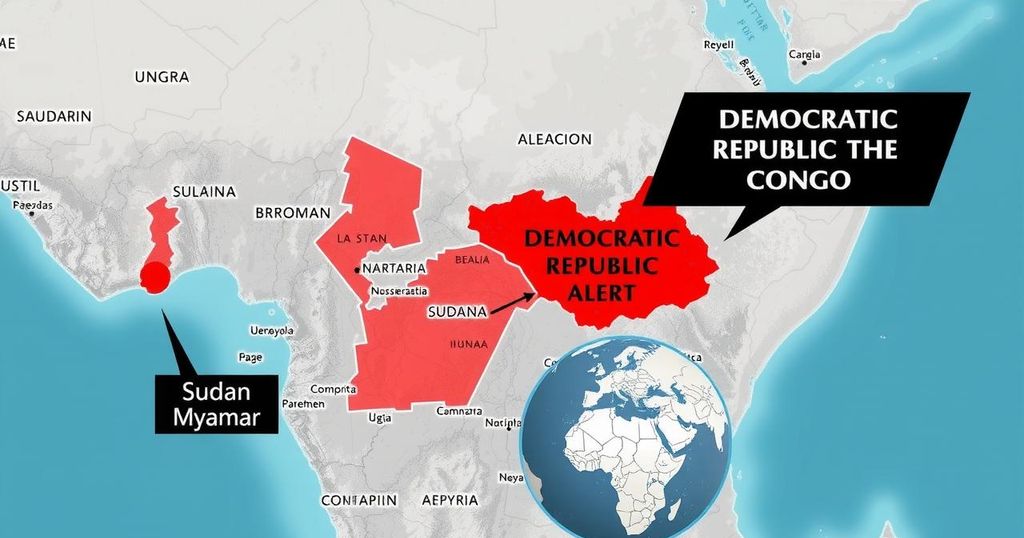The war in Sudan continues to critically harm civilians amidst a severe humanitarian crisis, with reports of intentional attacks and food insecurity affecting millions. In Myanmar, a flawed census reflects military control amid severe human rights abuses, particularly against the Rohingya. The DRC faces intensified violence linked to resource exploitation, necessitating continued international support through the UN peacekeeping mandate to protect civilians. These situations require immediate and sustained global attention and action.
The ongoing war in Sudan marks its 20th month, with the conflict inflicting severe suffering upon civilians and leading to an unprecedented humanitarian disaster. Recent attacks by the Sudanese Armed Forces (SAF) against the Rapid Support Forces (RSF) have resulted in numerous casualties, and both factions are preparing for heightened confrontations in Bahri, a city north of Khartoum. The violence has severely impacted Darfur, where a UN report disclosed at least 782 civilian fatalities since May 2024, while the death toll remains underestimated due to the precarious reporting conditions.
Currently, more than 24.6 million individuals in Sudan face acute food insecurity, with famine confirmed in specific localities, including Zamzam camp. According to the Integrated Phase Classification (IPC), swift escalation of the famine crisis is anticipated across various regions by mid-2025, exacerbated by the armed conflict and a warning from the UN Office for the Coordination of Humanitarian Affairs.
In Myanmar, ongoing hostilities between the military and ethnic resistance organizations have led to a botched census, conducted amidst an atmosphere of insecurity. The failure to recognize diverse ethnic groups exemplifies the junta’s disregard for humanitarian concerns. Civilians throughout Myanmar have been subjected to egregious human rights violations, including intentional assaults and rampant starvation risks, particularly for the Rohingya population. The UN Special Rapporteur has shed light on these gross injustices, emphasizing a dire need for improved humanitarian access.
In the Democratic Republic of the Congo (DRC), the UN Security Council has renewed MONUSCO’s mandate amidst rising violence from groups like the March 23 Movement (M23). Notably, the M23’s territorial expansion is linked to the struggle for mineral resources and directly threatens civilian safety. The increase in reports of human rights violations highlights the ongoing struggle for peace in the region and the significant obstacles that MONUSCO continues to face in fulfilling its mandate.
While the international community needs to press for immediate ceasefires and humanitarian aid provisions, longer-term resolutions necessitate the cessation of military aid to rogue states and the rethinking of corporate supply chains that exploit these conflict resources. Protection of civilians remains paramount to establishing enduring peace across these affected regions.
The humanitarian crises in Sudan, Myanmar, and the Democratic Republic of the Congo (DRC) represent significant global challenges, characterized by protracted conflicts resulting in widespread violence, human rights violations, and catastrophic socio-economic conditions. In Sudan, ongoing warfare between governmental and paramilitary forces has decimated civilian livelihoods, leading to severe food insecurity and recorded genocides in regions such as Darfur. Myanmar’s situation continues to deteriorate following a military coup, exacerbating ethnic divisions and human rights abuses, notably against the Rohingya population. In the DRC, systematic violence fueled by competition over extensive natural resources has resulted in displacement and increased humanitarian needs, underscoring the critical role of international intervention and protection efforts. These contexts necessitate urgent attention from the global community, which must address the root causes of these crises while enforcing international humanitarian laws to ameliorate civilian suffering and facilitate sustainable political solutions that respect the rights and voices of affected populations.
In summary, the persistent armed conflicts in Sudan, Myanmar, and the Democratic Republic of the Congo underscore the urgent need for international action to safeguard civilian populations and address the multifaceted humanitarian crises unfolding in these regions. Without decisive intervention and a rigorous commitment to uphold human rights, millions will continue to endure unimaginable hardship. Alignment of humanitarian efforts with robust advocacy for justice and accountability is essential to fostering lasting change and peace within these affected communities.
Original Source: www.globalr2p.org






